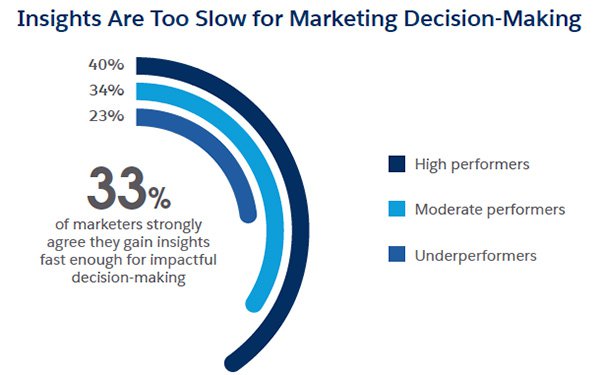
Despite the reach and the need for
more data, only 33% of marketers strongly agree they gain insights fast enough for impactful decision-making, and just 51% currently have employees who are dedicated to analytics, while about 80% say
their ability to track return on investment (ROI) for each marketing investment needs improvement.
Salesforce -- which surveyed more than 2,500 marketing decision-makers across 17 countries --
released Wednesday the Marketing Intelligence Report. The report analyzes how marketers use data and analytics to personalize customer experiences, navigate changes in data privacy regulation and
prepare for the complexity of cross-channel measurement.
Some 90% of marketers agree that recent data privacy changes have changed the way they measure marketing performance, and nearly four
in five say data quality is the most critical factor driving marketing-led growth and customer experience.
Many processes that analyze success and spend across channels remain manual. About
half of marketers say they perform data tasks such as quality-assurance checks and data-model mapping manually, but the majority describe the way their team integrates cross-channel data, partly
automatic, yet nearly one in five marketers still rely on manual methods, which takes time.
When manually integrating data, 29% of marketers spend at least one week per month collecting,
cleansing, and modeling data for reporting and analysis, according to the report.
Google’s third-party cookie deprecation and Apple’s Mail Privacy Protection that reduced the
relevance of email opens have forced marketers to shift their media spend. About half of marketers have increased their investment in paid social, mobile marketing, and web experiences.
Legacy
channels such as traditional TV and radio advertising were most likely to see a decline. Fifty-eight percent of consumers expect to do more online shopping after the pandemic than before, and 80% of
business buyers expect to conduct more business online.
- Paid social investments fell 7%, but increased 54%
- Mobile marketing fell 7%, but increased 52%
- Web
experiences fell 6%, but increased 51%
- Content marketing fell 7%, but increased 49%
- Paid search fell 8%, but increased 48%
- Email marketing fell 13%, but increased
43%
- Event marketing fell 13%, but increased 41%
- Programmatic display fell 9%, but increased 40%
- Affiliate marketing fell 9%, but increased 39%
- Out-of-home
marketing fell 12%, but increased 38%
- Connected TV and OTT fell 12%, but increased 36%
- Traditional TV and Radio fell 17%, but increased 32%
Nearly four in five
marketers globally participating in the Salesforce study said data quality is key to driving marketing-led growth and the customer experience. The second most important factor for growth and the
customer experience is marketing and sales teams must share business objectives.
Data Quality Drives Growth and the Customer Experience:
- Data quality – marketing led
growth 79%, and customer experience 77%
- Shared marketing, sales business objectives – marketing led growth 74%, and customer experience 75%
- Cross-channel analytics –
marketing led growth 73%, and customer experience 72%
- Collaboration across distributed teams – marketing led growth 73%, and customer experience 75%
- Real-time personalization
– marketing led growth 71%, and customer experience 74%
- Testing new marketing channels/platforms – marketing led growth 71%, and customer experience 72%
- Artificial
intelligence performance insights – marketing led growth 69%, and customer experience 71%
- Unified customer profiles – marketing led growth 67%, and customer experience 71%